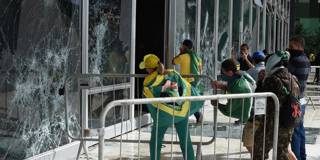Latin America is on the cusp of a geopolitical transformation. The question is what that transformation will look like, and how it will affect both inter-American relations and Latin America’s role in a more fluid and multipolar global system.
WASHINGTON, DC – Individual and collective limits are being tested around the world in 2023, and the Americas are no exception. Inflation is high and persistent. Supply chains are being disrupted. Food and energy insecurity are on the rise. Great-power competition is back. Non-state actors are challenging the rule of law and eroding the state’s monopoly on violence. International security and governance systems are deteriorating. Democracy is under threat. And amid this gathering storm, a fundamental transformation is unfolding across Latin America, though its trajectory remains far from certain.
Democracy in the region has shown considerable resilience in recent decades, and Latin America still represents the world’s most democratic developing region. But many countries across the Americas, including the United States, have experienced a kind of political recession over the past decade or so, characterized by the erosion of democratic institutions, norms, and practices.
In fact, democratic backsliding in the US may well be a driver of the trend elsewhere in the region. When it comes to democracy, unlike Las Vegas, what happens in the US does not stay in the US. The storming of Brazil’s government buildings in January is a case in point: almost exactly two years after an insurrection unfolded at the US Capitol to overturn the result of the 2020 presidential election, supporters of the defeated Jair Bolsonaro adopted the same tactic.

WASHINGTON, DC – Individual and collective limits are being tested around the world in 2023, and the Americas are no exception. Inflation is high and persistent. Supply chains are being disrupted. Food and energy insecurity are on the rise. Great-power competition is back. Non-state actors are challenging the rule of law and eroding the state’s monopoly on violence. International security and governance systems are deteriorating. Democracy is under threat. And amid this gathering storm, a fundamental transformation is unfolding across Latin America, though its trajectory remains far from certain.
Democracy in the region has shown considerable resilience in recent decades, and Latin America still represents the world’s most democratic developing region. But many countries across the Americas, including the United States, have experienced a kind of political recession over the past decade or so, characterized by the erosion of democratic institutions, norms, and practices.
In fact, democratic backsliding in the US may well be a driver of the trend elsewhere in the region. When it comes to democracy, unlike Las Vegas, what happens in the US does not stay in the US. The storming of Brazil’s government buildings in January is a case in point: almost exactly two years after an insurrection unfolded at the US Capitol to overturn the result of the 2020 presidential election, supporters of the defeated Jair Bolsonaro adopted the same tactic.